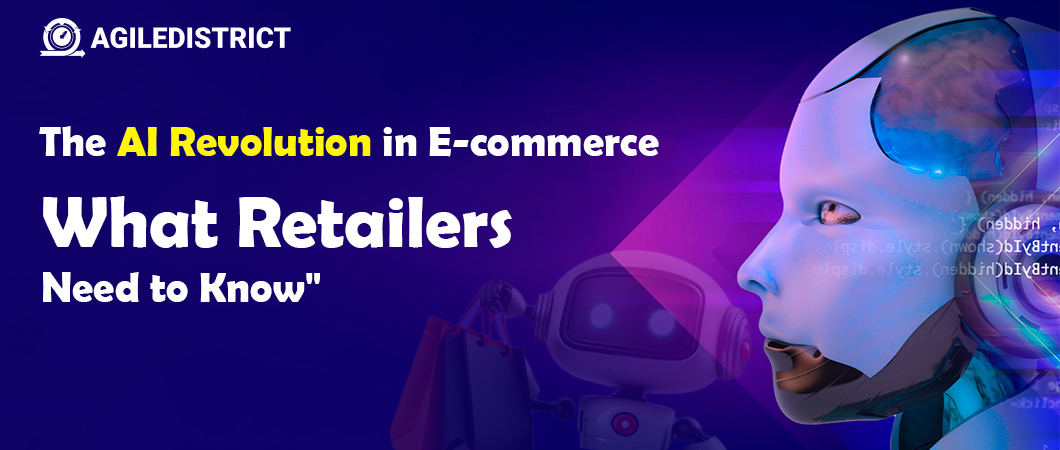Artificial intelligence is transforming online shopping, making it more personalized, efficient, and data-driven. Retailers who integrate AI in e-commerce are seeing significant improvements in customer engagement, sales, and operational efficiency.
According to market research, AI-driven e-commerce is expected to exceed $16 billion by 2030, with businesses leveraging e-commerce AI solutions to automate marketing, enhance customer support, and optimize supply chains.

How AI in E-commerce is Transforming Online Retail
Personalized Shopping Experiences with AI
AI-powered personalization is redefining how retailers interact with customers. By analyzing browsing behavior and purchase history, AI in e-commerce delivers hyper-personalized product recommendations. This results in:- Increased conversion rates
- Improved customer retention
- Higher average order values
Smart Inventory Management with AI
Managing stock levels is critical in retail. AI-driven demand forecasting helps businesses prevent stockouts and overstocking by predicting future sales trends. Ecommerce AI solutions optimize warehouse operations, reducing waste and maximizing profitability.AI-Powered Fraud Detection and Cybersecurity
With online transactions growing, fraud detection has become essential. AI identifies suspicious transactions in real time, preventing chargebacks and fraudulent activities. Retailers using AI in e-commerce can enhance security and build customer trust.Ecommerce AI Solutions: A Game-Changer for Retailers
Chatbots and Virtual Assistants for 24/7 Support
AI-driven chatbots provide instant customer support, answering common queries and assisting in purchases. These ecommerce AI solutions improve response times and customer satisfaction while reducing operational costs.AI in Customer Segmentation and Targeted Marketing
AI analyzes customer data to segment audiences based on preferences and behavior. This allows for targeted marketing campaigns, ensuring that customers receive relevant promotions and recommendations.Dynamic Pricing with AI
Retailers are leveraging AI in e-commerce to implement dynamic pricing models. AI algorithms analyze market trends, competitor pricing, and demand fluctuations to adjust product prices in real time, maximizing revenue.Visual Search and Image Recognition in E-commerce
AI-powered visual search enables customers to find products using images instead of text searches. Ecommerce AI solutions enhance user experience by allowing shoppers to upload pictures and find similar products instantly.AI-Driven Marketing Strategies in E-commerce
Predictive Analytics for Customer Behavior
Predictive analytics uses AI to anticipate customer needs, helping businesses craft marketing campaigns that convert. AI in e-commerce analyzes past behavior to suggest future purchases, boosting sales.AI-Powered Email Marketing and Retargeting
AI automates email marketing by sending personalized offers based on browsing history and abandoned carts. Ecommerce AI solutions ensure that potential buyers receive timely reminders, increasing conversion rates.AI-Generated Content for E-commerce
AI tools can create product descriptions, social media posts, and ads tailored to customer preferences, improving engagement and SEO rankings.AI in Supply Chain Optimization
Demand Forecasting with AI
AI predicts inventory needs by analyzing sales patterns, seasonal trends, and market conditions. AI in e-commerce reduces supply chain inefficiencies, ensuring products are available when needed.AI in Warehouse Automation
Automated warehouses use ecommerce AI solutions like robotic pickers and smart shelves to streamline order fulfillment. This minimizes errors and speeds up delivery times.AI-Powered Delivery Route Optimization
AI helps logistics teams optimize delivery routes, reducing fuel costs and ensuring faster shipments. AI in e-commerce improves last-mile delivery efficiency, enhancing customer satisfaction.Challenges and Ethical Considerations in AI Adoption
Data Privacy and Security Concerns
With AI collecting vast amounts of customer data, retailers must prioritize security and comply with regulations like GDPR. Ethical use of ecommerce AI solutions ensures transparency and trust.AI Bias in Decision-Making
AI models can inherit biases from training data, potentially leading to unfair customer treatment. Retailers must implement AI responsibly to ensure fairness.Cost and Implementation Barriers
While AI in e-commerce offers numerous benefits, high implementation costs can be a challenge for small businesses. However, cloud-based ecommerce AI solutions provide cost-effective alternatives.Future Trends in AI for E-commerce
AI and Voice Commerce
Voice assistants like Alexa and Google Assistant are changing how people shop. AI-driven voice search will play a significant role in future ecommerce AI solutions.Generative AI in Product Descriptions and Ads
AI-generated content is revolutionizing e-commerce marketing. Retailers are using AI to create compelling product descriptions and ad copy at scale.Blockchain and AI Integration
The combination of blockchain and AI in e-commerce enhances security, transparency, and efficiency in transactions and supply chains.Implementing AI in Your E-commerce Business
Steps to Integrate AI Solutions
- Identify areas where AI can optimize operations
- Choose the right ecommerce AI solutions based on business needs
- Partner with an AI expert like Agile District for seamless implementation